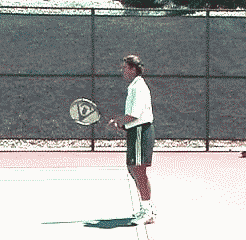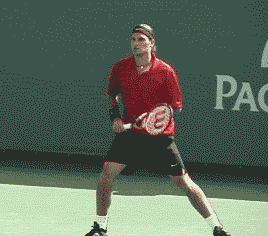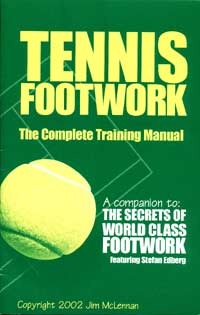|
TennisONE Lessons
This beautiful, complicated, maddening, yet lyrical game of tennis gives me such pleasure, but equally such a challenge. I continue to tinker with my own game and presently I am exploring a change in balance during my toss, and at the same time, I am experimenting with my mental frame of reference prior to serving or receiving. But in all cases, these changes are initiated consciously, but when mastered they will (at least I hope) become part of my unconscious arsenal. Just like the driver who suddenly realizes they haven’t really thought of anything for the last few miles (yet drove flawlessly), you and I play our best tennis in a similar unconscious zone. So how to find it? The late and great Fred Earle, master tennis coach, mentor and friend, used the following to get his players into the “now” and to free them from interfering swing thoughts or other processes that occupied their minds (and certainly this same method was paraphrased by Timothy Gallway in "Inner Tennis," though I prefer to think that Fred got there first). Simply whisper “bounce” and “hit” on either side of the net as the ball bounced and was hit. That is, as the ball approaches, whisper “bounce” at the moment the ball bounces, and “hit” as the moment of impact. Then as it approaches your hitting partner, again whisper “bounce” as it bounces and “hit” as they hit it back to you. (See Cat and Mouse in the TennisONE Library)
This seemingly simple drill will get you into a timing mode, independent of how you stroke the ball, but more to when you swing and when you move as they hit. Seemingly simple, because you will find this is really quite difficult. On the teaching court I see students attempt this drill, but somehow they whisper bounce either before or after it bounces (they are out of time) they whisper hit either before or after their partner hits (again they are out of time) and the same problems occur on their side of the net. With practice, really watching the ball to look for the moment it bounces and to look for the moment the ball is hit, they and you will get more in time with these two events. And with practice this drill starts to improve your timing. Now to the particulars on your partners side of the court. “Bounce” and “hit” on the other side of the net is all about timing your readiness and movement to the ball. As you whisper “bounce” you are readying yourself for the split step. As you whisper “hit,” land your split step and be ready to move in the wink of an eye. Late on the bounce and the split may not be landed on time, late on the hit and you are really in trouble, either the split is in fact late so you cannot move when you see where the ball is going, or early on the split and you get stuck to the ground, unable to get started. Watch the professionals, gathering as the ball bounces on the opponent’s side, and splitting just a fraction of a second after the hit. (See footwork/split step in the TennisONE Library)
Now to the particulars on your own side of the net. Bounce and hit on your side of the court is all about timing your preparation, and timing the start of the swing. As you whisper “bounce” (and you are on time) feel (this is important, don’t think but rather feel the following) whether you are rushing (you are late) you have already stepped in (you are early) or you are turned and the racquet is in some portion of the backswing (you are on time). (See Unit Turn in the TennisONE Library). As you whisper “hit” feel whether you are really contacting it where you want to, for somehow if you are whispering “hit” before the actual hit I suspect you are late, and if you whisper “hit” after the hit then I suspect you are reaching for the ball. As both a teacher and player I am becoming more aware of methods that get me into the moment without engaging cognitive processes. And I am beginning to see that when I think too much, or ask a student to think too much, somehow performance is compromised. Use “bounce hit” to get you into a timing zone, and enjoy the rhythmic graceful hitting that will follow. Your comments are welcome. Let us know what you think about Jim McLennan's article by emailing us here at TennisONE.
|
|||||||||||




